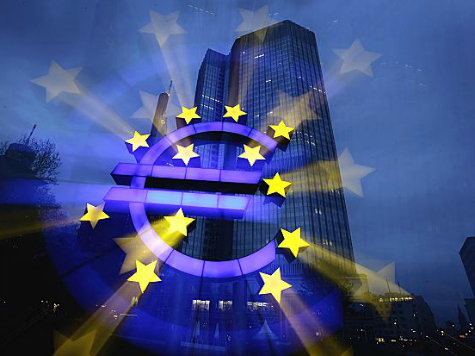
With producer prices in China declining for nearly three years, the European Union as China’s biggest trading partner has been importing deflation. But with Chinese deflation accelerating, Europe seems doomed to suffer a deflationary crash as consumers delay purchases, companies cancel investments, and workers suffer rising layoffs.
Inflation data published on Monday for the month of October reveals China’s rapid descent towards actual deflation as the consumer price index (CPI) rose just 1.6% from a year ago. The annual reading was the lowest rate since 2010 and flat from the prior month. Subtracting out the volatile food and energy components, Chinese “core inflation” plunged in October to a negative at -1.4% versus a year ago.
After growing from virtually zero two decades ago, the European Union is China’s biggest trading partner. The EU exports about $350 million of goods and services a day but imports $750 million per day from China. The result is a net trade deficit of about $350 million per day. Any change in China export prices are quickly felt in the EU.
Producer Price Index (PPI) for goods leaving Chinese factory gates fell from a negative -1.8% in September to a negative -2.2% in October. The accelerating decline in prices caps a string of 32 straight months of deflating prices.
Falling PPI would normally be a sign that a nation’s interest rates are too high and monetary policy too tight, but the price decline is due to commodity prices that have been plummeting since May of 2012 and are now below the crisis levels at the depth of the 2008 financial crash. As a resource poor nation, monetary stimulation and lower interest rates would little impact reducing falling goods prices.
China’s strong export surplus with the EU and others has meant that the domestic labor market has remained tight. While average worker wages in China increased by 9.3% in the first nine months of 2014, EU wages were only up by +1%. Labor demand also explains why average youth unemployment in the EU was 18.1% and only 7.4% in China, according to the International Labour report for 2012.
The European Union officially estimated the current inflation rate is +.04% annually, despite the EU targeting a positive +2% rate. Many analysts including Boskin Commission Report, Hausman’s Journal of Economic Perspectives survey, Robert Gordon, and Mark Wynne believe that EU inflation is positively overstated by a +0.7% to +2.2%. Such an adjustment would mean the EU is already in serious deflation.
The International Monetary Fund’s latest world economic outlook (WEO) raised the probability of deflation in the Eurozone over the next six months from 20% earlier this year to 30%. But with the huge flow of deflated Chinese goods in transit to the EU, the probability of the EU officially being in deflation would seem to be much higher.
Then-U.S. Federal Reserve Chairman Ben Bernanke opined in 2002 that “sustained deflation can be highly destructive to a modern economy and should be strongly resisted.” Current Chairwoman Janet Yellen shared his concerns in a 2009 speech: “It is conceivable that this very low inflation could turn into outright deflation. Worse still, if deflation were to intensify, we could find ourselves in a devastating spiral in which prices fall at an ever-faster pace and economic activity sinks more and more.”
What economists fear about deflation is not that prices get cheaper, but rather that the expectation of cheaper prices will cause consumers to delay purchases and stimulate employers to cut back production and lay-off workers.
What European social welfare states fear most about deflation is that their tax systems are designed to use inflation combined with progressive income tax rates as a tool to accelerate wealth redistribution from the people to the state. Deflation would reverse that process as tax collections will wither faster than the economy slows.
With the European Union already near zero growth, despite what most economist believe is a substantial overstatement of inflation, Chinese deflationary exports in transit seem sure to push the European Union into deflation.
Chriss Street suggest that if you are interested in global competitiveness, please click on U.S. Oil Exports Hit 57 Year High

COMMENTS
Please let us know if you're having issues with commenting.